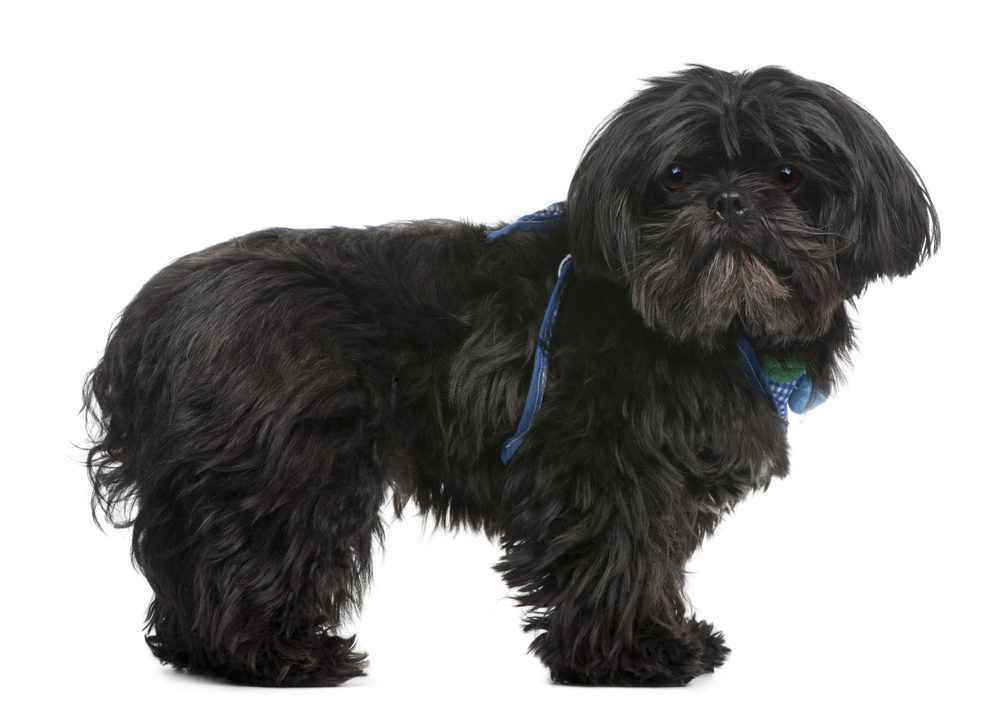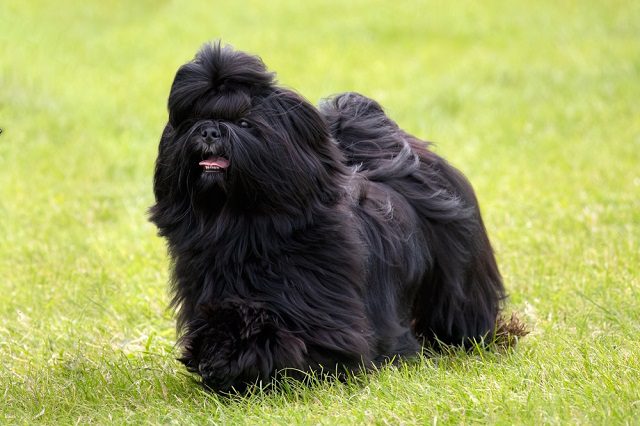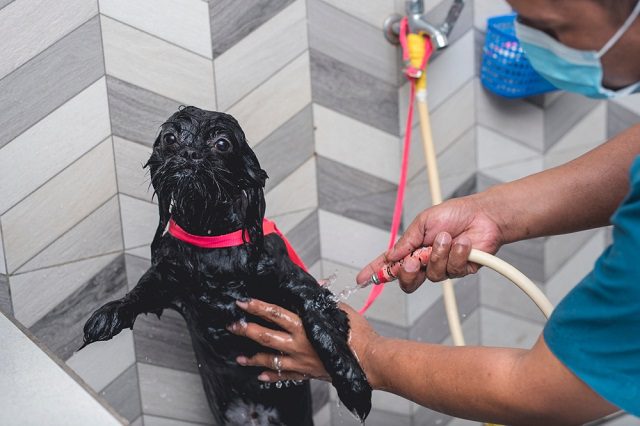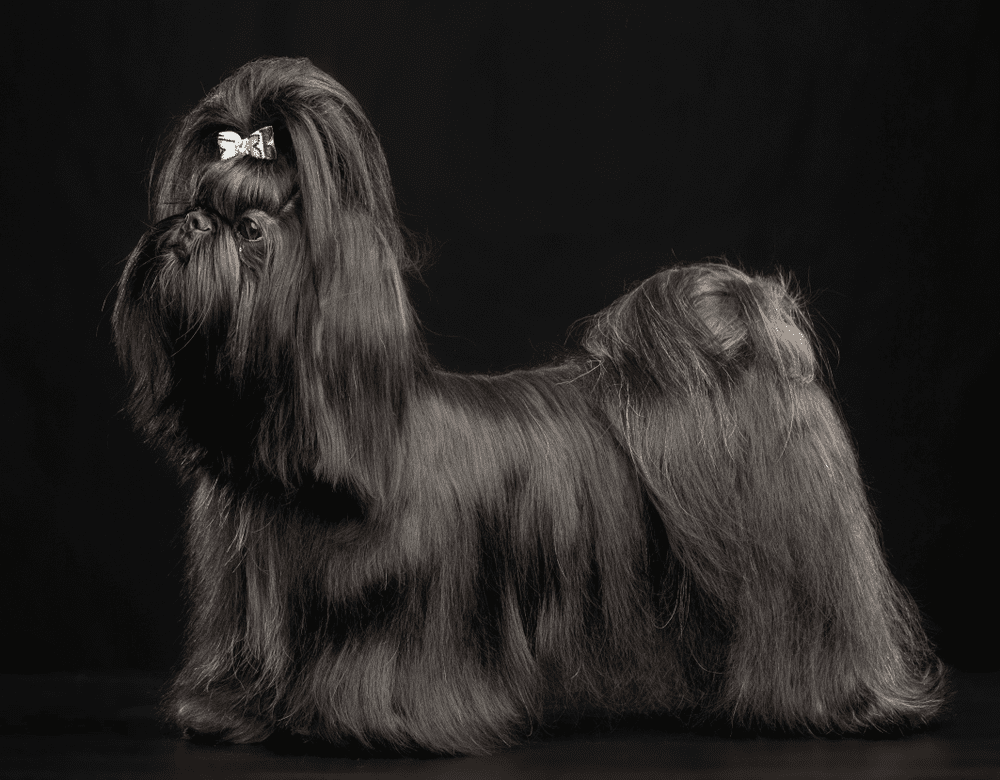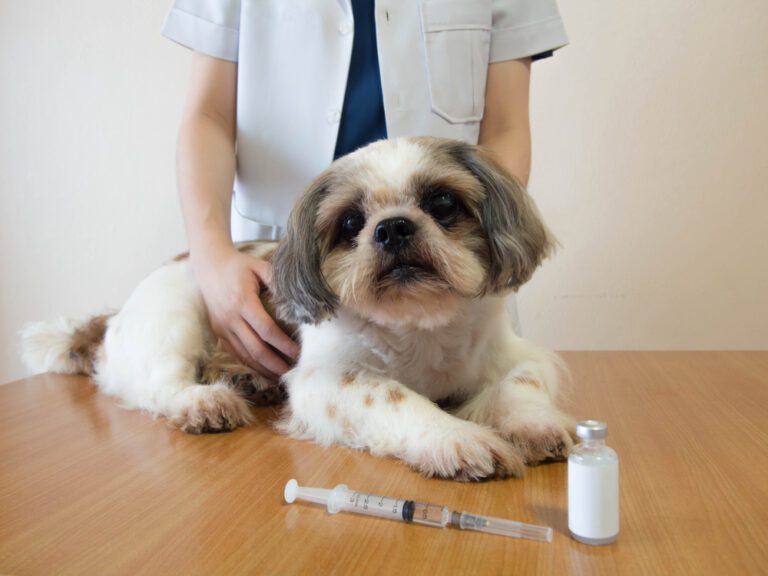Health Considerations for Black Shih Tzus: Common Issues to Watch For
Black Shih Tzus captivate pet lovers with their striking, glossy black coats and expressive eyes, marking them as a charming Shih Tzu breed variant. These dogs not only brag a distinctive aesthetic but also bring joy and companionship to their owners.
However, their unique coloring comes with specific health considerations; Black Shih Tzus are more frequently predisposed to certain conditions than their lighter-colored counterparts. This introduction delves into Black Shih Tzus’ everyday health challenges, aiming to equip owners with the knowledge needed to ensure these beautiful pets lead healthy, vibrant lives.
Key Health Risks for Black Shih Tzus
Understanding the unique health risks of black shih tzus is crucial for their care. This detailed examination covers genetic predispositions and symptoms that may indicate emerging health concerns, helping owners keep their beloved pets in optimal health.
Genetic Health Concerns
Black Shih Tzus are susceptible to several inherited conditions that owners should monitor. Common genetic predispositions include:
- Hip Dysplasia: This condition involves improper hip joint formation, leading to pain and arthritis. It’s particularly problematic in small breeds like Shih Tzus, affecting mobility and quality of life.
- Eye Disorders: Progressive retinal atrophy is more prevalent among dogs with darker coats. This degenerative eye disease can progress to blindness if not identified and managed early.
- Skin Allergies and Dermatitis: Black Shih Tzus’ dense, luxurious coats may predispose them to skin issues. Allergens trapped in the fur can cause allergic reactions, leading to dermatitis and other skin infections.
These genetic issues underscore the importance of genetic screening and proactive health care to manage and mitigate potential problems.
Indicative Symptoms of Health Issues
Recognizing early symptoms of health issues can significantly impact the management and treatment outcomes for Black Shih Tzus:
- Joint Health Symptoms: Signs such as limping, reluctance to jump or climb stairs, and visible discomfort during movement can indicate joint issues like hip dysplasia.
- Skin and Coat Symptoms: Persistent scratching, redness, and hair loss are telltale signs of skin allergies or infections. Regular grooming and veterinary check-ups can help manage these symptoms.
- Eye Health Symptoms: Look for redness, tearing, or cloudiness in the eyes. These symptoms can indicate severe conditions requiring veterinary attention.
- Respiratory Symptoms: Difficulty breathing, wheezing, or excessive snoring are common in brachycephalic breeds and may point to respiratory issues.
Early detection and prompt treatment are essential to effectively managing these health risks. Owners should maintain regular veterinary visits and monitor their Black Shih Tzus for any signs of discomfort or illness, ensuring they receive timely care and live healthy, happy lives.
Skin and Coat Health for Black Shih Tzus
With their distinctive, dense coats, Black Shih Tzus are particularly susceptible to various skin and coat health issues. Understanding these challenges and implementing effective grooming practices can significantly reduce the risk of dermatological problems.
Common Dermatological Issues
Two of the most frequent skin conditions affecting Black Shih Tzus are allergies and eczema:
- Allergies: These can be triggered by various environmental factors, such as pollen, dust, and certain foods. Symptoms typically include itching, redness, and skin irritation. If the dog scratches or bites the irritated areas, allergies can lead to secondary infections.
- Eczema: This chronic skin condition causes itchy, inflamed, and dry skin. In Black Shih Tzus, eczema can be exacerbated by their thick fur, which traps moisture and debris close to the skin, creating an ideal environment for irritation and infections.
Grooming Practices to Enhance Skin Health
Maintaining a regular and thorough grooming routine is vital for preventing and managing skin conditions in Black Shih Tzus:
- Regular Brushing: Brushing several times a week helps remove dead hair and skin, distribute natural skin oils, and prevent matting. This is crucial for maintaining skin health and overall coat condition.
- Bathing: Regular baths with hypoallergenic, dog-specific shampoo can help soothe irritated skin and wash away allergens attached to the dog’s fur. However, it’s crucial not to over-bathe, as this can strip essential oils from the skin and exacerbate skin problems.
- Diet and Supplements: Incorporating a balanced diet with omega fatty acids can improve skin health from the inside out. Omega fatty acids help maintain the skin’s barrier function and reduce inflammation.
- Environmental Management: Reducing exposure to known allergens can prevent flare-ups. This includes regular bedding cleaning, avoiding walking in high-pollen areas during peak seasons and using air purifiers to reduce indoor allergens.
- Regular Vet Check-ups: Professional assessments can help identify the root causes of skin issues and allow for early treatment plans to prevent conditions from worsening.
Adhering to these grooming practices and staying vigilant for signs of skin trouble can help owners of black shih tzus ensure their pets maintain healthy, beautiful coats free from discomfort and irritation.
Eye Health Considerations for Black Shih Tzus
Maintaining the eye health of Black Shih Tzus is crucial due to their susceptibility to certain ocular conditions. Understanding these common eye issues and implementing preventative measures can help ensure the long-term vision health of these dogs.
Common Eye Conditions in Black Shih Tzus
Black Shih Tzus can be prone to several eye problems, some of which are particularly serious due to their genetic makeup and facial structure:
- Progressive Retinal Atrophy (PRA): This genetic disorder involves the gradual deterioration of the retina, potentially leading to blindness. Early diagnosis may help manage the advancement, although no cure exists.
- Keratoconjunctivitis Sicca (Dry Eye): This condition is characterized by reduced tear production, leading to dry, itchy eyes that can become infected if not properly managed.
- Distichiasis occurs when eyelashes grow in abnormal locations on the eyelid, leading to eye surface irritation. It can cause discomfort and, if left untreated, more severe damage to the eye.
Preventative Measures and Signs Requiring Veterinary Attention
To protect against these conditions, several proactive steps can be taken:
- Regular Eye Examinations: Routine check-ups with a veterinarian can help catch early signs of eye conditions before they become severe. These exams should be part of a Black Shih Tzu’s regular health routine.
- Proper Grooming: Keeping the fur around the eyes trimmed can prevent irritation caused by hairs poking into the eye, which is a common issue for breeds with longer facial hair.
- Environmental Controls: Minimizing exposure to irritants such as smoke, dust, and overly dry environments can help reduce the risk of eye issues.
Owners should be aware of signs that indicate the need for immediate veterinary intervention, which include:
- Persistent Redness or Irritation: Any sign of ongoing discomfort around the eyes is a clear signal for a vet visit.
- Discharge or Excessive Tearing: Changes in the appearance of the eye discharge or sudden onset of constant tearing are concerns.
- Visible Changes in Eye Appearance: Cloudiness, color changes, or apparent changes in pupil size necessitate an instant examination by a veterinarian.
Implementing these preventative measures and staying vigilant for the signs of eye health issues can help ensure that Black Shih Tzus maintain good eye health throughout their lives. Regular veterinary care is essential to managing these conditions effectively and can significantly contribute to the quality of life of these beloved pets.
Respiratory System Concerns for Black Shih Tzus
Like other brachycephalic (short-nosed) breeds, black Shih Tzus often face unique challenges related to their respiratory systems. A primary concern is brachycephalic respiratory syndrome, a condition that can significantly impact their quality of life. Understanding this syndrome and how to manage its symptoms is crucial for maintaining the health and well-being of these dogs.
Brachycephalic Respiratory Syndrome
Brachycephalic respiratory syndrome encompasses several abnormalities affecting the upper airways, including narrowed nostrils, elongated soft palate, and larynx collapse. These anatomical irregularities can lead to difficulty breathing, snoring, gagging, and, in severe cases, complete airway obstruction. The syndrome is particularly exacerbated by stress, exercise, and hot or humid weather, all of which can increase the risk of respiratory distress in these dogs.
Management and Reduction of Respiratory Issues
Effective management of respiratory concerns in Black Shih Tzus involves both preventative measures and lifestyle adjustments:
- Avoid Overheating and High Humidity: Keeping your dog in a relaxed, climate-controlled environment reduces the risk of respiratory distress. During hot weather, it’s essential to provide an excellent, shaded area and ensure they have access to plenty of water.
- Controlled Exercise: While regular exercise is essential, it should not be strenuous. Activities should be short and gentle to prevent overexertion, which can lead to breathing difficulties. Walking these dogs during more excellent parts of the day, such as early morning or late evening, is best.
- Weight Management: Maintaining a healthy weight is crucial. Excess weight puts additional stress on the respiratory system, exacerbating breathing problems.
- Regular Veterinary Check-ups: Frequent visits to the vet can help monitor the progression of respiratory issues and allow for early intervention. Surgical options may be recommended to improve airway function and correct anatomical abnormalities, such as widening the nostrils or shortening the soft palate.
- Stress Reduction: Stress can trigger or worsen respiratory issues, so keeping your Shih Tzu calm is critical. Using pheromone diffusers and providing a quiet, safe space can help manage their anxiety.
By understanding and addressing the unique respiratory challenges faced by Black Shih Tzus, owners can significantly improve their pets’ comfort and quality of life. These affectionate, charming dogs need regular vet care, appropriate lifestyle modifications, and respiratory health monitoring.
Joint and Bone Care for Black Shih Tzus
Proper joint and bone care is crucial for maintaining the health and mobility of black shih tzus. Like many small dogs, this breed can be susceptible to specific musculoskeletal conditions, with hip dysplasia among the most common. Understanding these issues and implementing strategies for prevention can help ensure a long, active life for these dogs.
Common Joint Problems in Black Shih Tzus
Hip dysplasia is a significant concern in Black Shih Tzus. It is characterized by a malformation of the hip joint that can lead to arthritis and debilitating pain. This condition results from genetic and environmental factors, and while it’s more frequently associated with larger breeds, small breeds are not immune. Early detection through regular veterinary screenings can help manage this condition effectively, potentially avoiding severe complications as the dog ages.
Dietary and Exercise Considerations for Optimal Joint Health
Maintaining joint and bone health in Black Shih Tzus requires a holistic approach centered on diet and exercise:
- Balanced Diet: A diet rich in essential nutrients, particularly omega-3 fatty acids, glucosamine, and chondroitin, can support joint health. These nutrients help reduce inflammation and promote the repair of cartilage. Consulting a vet to tailor a diet plan that meets these nutritional needs can be beneficial.
- Controlled Exercise: Regular, moderate exercise helps keep the joints mobile and muscles strong, alleviating pressure on the joints and reducing the risk of joint-related problems. Activities should suit the dog’s size and age, focusing on gentle, low-impact exercises like walking or swimming.
- Weight Management: Keeping your Shih Tzu healthy is critical; excess weight strains joints and aggravates conditions like hip dysplasia. Regular weigh-ins and portion control are essential components of weight management.
- Supplements: In some cases, dietary supplements may be recommended to support joint health. Always discuss using supplements with your veterinarian to ensure they are appropriate for your pet’s specific health needs.
By focusing on a comprehensive care plan that includes proper nutrition, appropriate exercise, and regular veterinary care, owners can significantly enhance the joint and bone health of their Black Shih Tzus. These measures improve the quality of life for these dogs and help prevent the onset of more severe musculoskeletal issues as they age.
Proactive Health Strategies for Black Shih Tzus
Ensuring the health and longevity of Black Shih Tzus involves proactive health management. Regular veterinary check-ups and a well-planned vaccination schedule are crucial to this proactive approach. By understanding and implementing these strategies, owners can protect their pets from various health issues and enhance their overall well-being.
Importance of Regular Veterinary Check-ups
Regular veterinary visits are essential for maintaining the health of Black Shih Tzus. These check-ups allow for early detection of potential health issues that might not yet be visible to the owner. Early diagnosis often leads to more effective treatment and can prevent minor issues from developing into serious problems. During these visits, veterinarians can monitor the dog’s weight, check for signs of diseases, assess dental health, and provide guidance on diet and exercise tailored to the dog’s specific needs.
Vaccinations and Preventative Treatments
Vaccinations are pivotal in protecting Black Shih Tzus from common infectious diseases. The core dog vaccines include protection against rabies, distemper, parvovirus, and hepatitis. Additional vaccines, such as those for kennel cough or Lyme disease, may be recommended depending on the dog’s environment and lifestyle.
Preventive measures are essential to guard against parasites such as fleas, ticks, and heartworms. These treatments should be administered regularly as prescribed by a veterinarian. Fleas and ticks can cause serious health issues, including Lyme disease and flea allergy dermatitis, while heartworms can lead to severe lung disease, heart failure, and other organ damage.
- Flea and Tick Prevention: Monthly treatments or collars can effectively keep these pests at bay. Always choose products specifically recommended for the dog’s weight and health condition.
- Heartworm Prevention: Given the seriousness of heartworm disease, preventive medication is recommended year-round and should be administered as your vet prescribes.
Incorporating these proactive health strategies into the routine care of Black Shih Tzus is essential for their well-being. Regular veterinary check-ups, up-to-date vaccinations, and consistent preventive treatments form the cornerstone of effective health management, ensuring these beloved pets lead healthy, happy lives.
Nutritional Management for Black Shih Tzus
Proper nutrition is vital for maintaining Black Shih Tzus’s health and well-being. This breed may have specific dietary needs that must be addressed to prevent and manage common health issues. Tailoring a diet that fits their unique requirements can help mitigate potential health problems and support a long, vibrant life.
Specific Dietary Requirements for Optimal Health
Black Shih Tzus benefit from a diet that supports their energy levels while considering their susceptibility to specific health conditions like obesity, joint problems, and digestive issues. A balanced diet of high-quality protein sources is essential for muscle maintenance and overall health. Carbohydrates should come from digestible sources like sweet potatoes or brown rice to maintain energy and facilitate digestion.
Fats are crucial for skin and coat health, particularly for Black Shih Tzus, who may suffer from skin allergies and dryness. Omega-3 fatty acids, found in fish oils and flaxseeds, are particularly beneficial as they help reduce inflammation and improve coat health.
Dietary Recommendations to Prevent and Manage Health Issues
- Weight Control: Obesity poses a serious health threat to Black Shih Tzus, worsening joint problems and contributing to metabolic and heart conditions. Monitoring calorie intake and adjusting portions based on the dog’s activity level, age, and metabolic rate is crucial. Treats should also be given sparingly and considered part of the overall calorie count.
- Joint Health Support: For those prone to joint issues like hip dysplasia, diets supplemented with glucosamine and chondroitin can be beneficial. These supplements help maintain cartilage health and reduce joint pain and inflammation.
- Digestive Health: Probiotics can be added to the diet to enhance gut health, improving digestion and nutrient absorption. This is particularly important for Black Shih Tzus, who may experience sensitive stomachs or other digestive issues.
- Allergy Management: If allergies are a concern, hypoallergenic diets that avoid common allergens like chicken, beef, or grains can be crucial. Novel protein sources such as venison or duck and limited-ingredient diets can help minimize the risk of allergic reactions.
- Hydration: Ensuring that Black Shih Tzus stays adequately hydrated is essential, especially for maintaining urinary tract health. Fresh water should always be available, and incorporating wet foods into the diet can also help increase water intake.
By addressing these specific dietary needs, owners can significantly impact the health and happiness of their Black Shih Tzus. Consulting with a veterinarian or a canine nutritionist to tailor a diet plan is recommended to ensure that all nutritional needs are met effectively, providing a solid foundation for a healthy life.
Conclusion
Maintaining the health and well-being of Black Shih Tzus requires a comprehensive approach that includes understanding their unique physical needs and potential health challenges. Key aspects such as managing brachycephalic respiratory syndrome, addressing joint and bone health issues like hip dysplasia, preventing common eye conditions, and tailoring their diet to support overall health are crucial. Regular veterinary check-ups, timely vaccinations, and preventive treatments form the cornerstone of proactive pet care.
Effective grooming and careful monitoring of their environment can help prevent skin issues and allergies. By adopting a vigilant and informed approach to their care, owners of Black Shih Tzus can ensure their pets live comfortably and thrive, fostering a deep, rewarding bond that enhances the lives of both pets and owners. Pets and owners.
FAQ,s
What joint health issues should I watch for in my Black Shih Tzu?
Look for brachycephalic respiratory syndrome, skin allergies, hip dysplasia, and eye problems such as progressive retinal atrophy. Regular vet visits allow for early detection, which can help manage these conditions effectively.
How often should I schedule veterinary check-ups for my Black Shih Tzu?
Annual check-ups are essential for overall health maintenance, but puppies, senior dogs, and those with existing health conditions may require more frequent visits. These appointments are vital for tracking health changes and identifying problems early.
What is the ideal diet for a Black Shih Tzu with sensitive skin?
Choose premium, hypoallergenic dog food that promotes skin health. It usually contains novel proteins and omega-3 fatty acids. Consult your vet to tailor the diet to your dog’s allergies or sensitivities.
How can I tell if my Black Shih Tzu is having respiratory problems?
Signs such as difficulty breathing, excessive snoring, and reluctance to engage in physical activity can indicate respiratory issues, which are common in brachycephalic breeds. If these symptoms occur, prompt veterinary evaluation is necessary.
What are the best grooming practices for a Black Shih Tzu?
Regular brushing and bathing with hypoallergenic shampoo are essential, especially to manage skin allergies and maintain coat health. Pay special attention to cleaning the folds around the face and the eyes to prevent irritation and infection.

